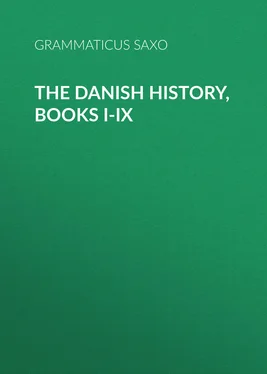Grammaticus Saxo - The Danish History, Books I-IX
Здесь есть возможность читать онлайн «Grammaticus Saxo - The Danish History, Books I-IX» — ознакомительный отрывок электронной книги совершенно бесплатно, а после прочтения отрывка купить полную версию. В некоторых случаях можно слушать аудио, скачать через торрент в формате fb2 и присутствует краткое содержание. Жанр: foreign_prose, История, Старинная литература, foreign_edu, foreign_antique, на английском языке. Описание произведения, (предисловие) а так же отзывы посетителей доступны на портале библиотеки ЛибКат.
- Название:The Danish History, Books I-IX
- Автор:
- Жанр:
- Год:неизвестен
- ISBN:нет данных
- Рейтинг книги:4 / 5. Голосов: 1
-
Избранное:Добавить в избранное
- Отзывы:
-
Ваша оценка:
- 80
- 1
- 2
- 3
- 4
- 5
The Danish History, Books I-IX: краткое содержание, описание и аннотация
Предлагаем к чтению аннотацию, описание, краткое содержание или предисловие (зависит от того, что написал сам автор книги «The Danish History, Books I-IX»). Если вы не нашли необходимую информацию о книге — напишите в комментариях, мы постараемся отыскать её.
The Danish History, Books I-IX — читать онлайн ознакомительный отрывок
Ниже представлен текст книги, разбитый по страницам. Система сохранения места последней прочитанной страницы, позволяет с удобством читать онлайн бесплатно книгу «The Danish History, Books I-IX», без необходимости каждый раз заново искать на чём Вы остановились. Поставьте закладку, и сможете в любой момент перейти на страницу, на которой закончили чтение.
Интервал:
Закладка:
Who were our forbears? How did day and night, sun and moon, earth and water, and fire come? How did the animals come? Why has the bear no tail? Why are fishes dumb, the swallow cleft-tail? How did evil come? Why did men begin to quarrel? How did death arise? What will the end be? Why do dead persons come back? What do the dead do? What is the earth shaped like? Who invented tools and weapons, and musical instruments, and how? When did kings and chiefs first come?
From accepted answers to such questions most of the huge mass of mythology arises. Man makes his gods in his own image, and the doctrines of omen, coincidence, and correspondence helped by incessant and imperfect observation and logic, bring about a system of religious observance, of magic and ritual, and all the masses of folly and cruelty, hope and faith, and even charity, that group about their inventions, and seem to be the necessary steps in the onward path of progressive races.
When to these we add the true and exaggerated memories of actual heroes, the material before the student is pretty completely comprised. Though he must be prepared to meet the difficulties caused in the contact of races, of civilisations, by the conversion of persons holding one set of mythical ideas to belief in another set of different, more attractive, and often more advanced stage.
The task of arriving at the scientific, speculative ethic, and the actual practice of our remote ancestry (for to that end is the student of mythology and folk-lore aiming) is not therefore easy. Nor is the record perfect, though it is not so poor in most cases as was once believed. The Brothers Grimm, patriarchs alike as mythologists and folk-lorists, the Castor and Pollox of our studies, have proved this as regards the Teutonic nations, just as they showed us, by many a striking example, that in great part folk-lore was the mythology of to-day, and mythology the folk-lore of yesterday.
In many cases we are helped by quite modern material to make out some puzzle that an old tale presents, and there is little doubt but that the present activity in the field of folklore will not only result in fresh matter but in fresh methods freshly applied.
The Scandinavian material, at all events, is particularly rich: there is the extensive Icelandic written literature touching the ninth and tenth and eleventh centuries; the noble, if fragmentary remains of Old Northern poetry of the Wickingtide; and lastly, the mass of tradition which, surviving in oral form, and changing in colour from generation to generation, was first recorded in part in the seventeenth, and again in part, in the present century; and all these yield a plentiful field for research. But their evidence gains immensely by the existence of Saxo's nine books of traditional and mythic lore, collected and written down in an age when much that was antique and heathen was passing away forever. The gratitude due to the Welshman of the twelfth century, whose garnered hoard has enriched so many poets and romances from his day to now, is no less due to the twelfth-century Dane, whose faithful and eloquent enthusiasm has swept much dust from antique time, and saved us such a story as Shakespeare has not disdained to consecrate to highest use. Not only Celtic and Teutonic lore are the richer for these two men, but the whole Western world of thought and speech. In the history of modern literature, it is but right that by the side of Geoffrey an honourable place should be maintained for Saxo, and
"awake remembrance of these mighty dead."
–Oliver Elton
THE DANISH HISTORY OF SAXO GRAMMATICUS
PREFACE
Forasmuch as all other nations are wont to vaunt the glory of their achievements, and reap joy from the remembrance of their forefathers: Absalon, Chief Pontiff of the Danes, whose zeal ever burned high for the glorification of our land, and who would not suffer it to be defrauded of like renown and record, cast upon me, the least of his followers—since all the rest refused the task—the work of compiling into a chronicle the history of Denmark, and by the authority of his constant admonition spurred my weak faculty to enter on a labour too heavy for its strength. For who could write a record of the deeds of Denmark? It had but lately been admitted to the common faith: it still languished as strange to Latin as to religion. But now that the holy ritual brought also the command of the Latin tongue, men were as slothful now as they were unskilled before, and their sluggishness proved as faultful as that former neediness. Thus it came about that my lowliness, though perceiving itself too feeble for the aforesaid burden, yet chose rather to strain beyond its strength than to resist his bidding; fearing that while our neighbours rejoiced and transmitted records of their deeds, the repute of our own people might appear not to possess any written chronicle, but rather to be sunk in oblivion and antiquity. Thus I, forced to put my shoulder, which was unused to the task, to a burden unfamiliar to all authors of preceding time, and dreading to slight his command, have obeyed more boldly than effectually, borrowing from the greatness of my admonisher that good heart which the weakness of my own wit denied me.
And since, ere my enterprise reached its goal, his death outran it; I entreat thee chiefly, Andrew, who wast chosen by a most wholesome and accordant vote to be successor in the same office and to headship of spiritual things, to direct and inspire my theme; that I may baulk by the defence of so great an advocate that spiteful detraction which ever reviles what is most conspicuous. For thy breast, very fruitful in knowledge, and covered with great store of worshipful doctrines, is to be deemed a kind of shrine of heavenly treasures. Thou who hast searched through Gaul and Italy and Britain also in order to gather knowledge of letters and amass them abundantly, didst after thy long wandering obtain a most illustrious post in a foreign school, and proved such a pillar thereof, that thou seemedst to confer more grace on thy degree than it did on thee. Then being made, on account of the height of thy honours and the desert of thy virtues, Secretary to the King, thou didst adorn that employment, in itself bounded and insignificant, with such works of wisdom as to leave it a piece of promotion for men of greatest rank to covet afterwards, when thou wert transferred to that office which now thou holdest. Wherefore Skaane has been found to leap for joy that she has borrowed a Pontiff from her neighbours rather than chosen one from her own people; inasmuch as she both elected nobly and deserved joy of her election. Being a shining light, therefore, in lineage, in letters, and in parts, and guiding the people with the most fruitful labours of thy teaching, thou hast won the deepest love of thy flock, and by thy boldness in thy famous administration hast conducted the service thou hast undertaken unto the summit of renown. And lest thou shouldst seem to acquire ownership on the strength of prescription, thou hast, by a pious and bountiful will, made over a very rich inheritance to Holy Church; choosing rather honourably to reject riches (which are covered with the rust of cares) than to be shackled with the greed of them and with their burden. Likewise thou hast set about an amazing work upon the reverend tenets of the faith; and in thy zeal to set the service of public religion before thy private concerns, hast, by the lesson of thy wholesome admonitions, driven those men who refused payment of the dues belonging to religion to do to holy things the homage that they ought; and by thy pious gift of treasure hast atoned for the ancient neglect of sacred buildings. Further, those who pursued a wanton life, and yielded to the stress of incontinence above measure, thou hast redeemed from nerveless sloth to a more upright state of mind, partly by continuing instant in wholesome reproof, and partly by the noble example of simple living; leaving it in doubt whether thou hast edified them more by word or deed. Thus thou, by mere counsels of wisdom, hast achieved what it was not granted to any of thy forerunners to obtain.
Читать дальшеИнтервал:
Закладка:
Похожие книги на «The Danish History, Books I-IX»
Представляем Вашему вниманию похожие книги на «The Danish History, Books I-IX» списком для выбора. Мы отобрали схожую по названию и смыслу литературу в надежде предоставить читателям больше вариантов отыскать новые, интересные, ещё непрочитанные произведения.
Обсуждение, отзывы о книге «The Danish History, Books I-IX» и просто собственные мнения читателей. Оставьте ваши комментарии, напишите, что Вы думаете о произведении, его смысле или главных героях. Укажите что конкретно понравилось, а что нет, и почему Вы так считаете.












